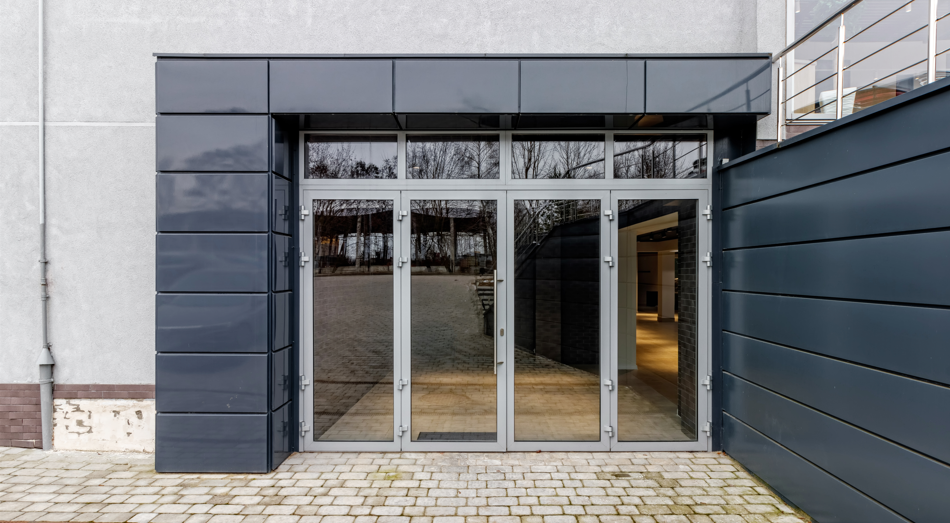Accessibility and Commercial Doors: Compliance and Beyond
Accessibility has increasingly become a pivotal concern for businesses, driven by awareness and legal responsibilities. At the forefront of this transformation are commercial doors, which serve as essential conduits for accessibility. Ensuring that these doors are compliant with the Americans with Disabilities Act (ADA) is vital not only for legal compliance but also for enhancing business reputation and customer satisfaction. ADA compliance extends beyond mere legalities; it signifies a commitment to inclusivity and a broader reach in an increasingly diverse marketplace.
The ADA, enacted in 1990, revolutionized the way businesses approach accessibility. This comprehensive civil rights law prohibits discrimination against individuals with disabilities in all areas of public life, including jobs, schools, transportation, and all public and private places open to the general public. A critical yet often underestimated requirement of the ADA is the mandate for door accessibility. This encompasses attributes such as width, hardware, threshold height, and the force required to operate the doors. Doors that comply with ADA standards ensure that all individuals, regardless of physical ability, can enter and navigate businesses easily and independently.
Beyond the legal framework, there are substantial operational benefits associated with ADA-compliant commercial doors. From an economic perspective, businesses that prioritize accessibility can tap into a broader customer base. By accommodating individuals with disabilities, businesses not only align with legal obligations but also resonate with an audience that appreciates and demands inclusivity. Positive word-of-mouth and brand loyalty are often garnered by enterprises that visibly prioritize accessibility, translating to increased foot traffic and sales.
Incorporating ADA-compliant doors and accessibility features within business premises is about more than compliance—it’s a strategic investment in a company’s brand and reputation. Enhancing the accessibility of a physical space conveys a message that a business cares for all potential customers. This fosters a positive brand image, attracting a more diverse clientele and potentially increasing consumer loyalty. In contrast, failure to comply can lead to legal ramifications and damage to reputation, which can hurt profitability.
Technological advancements have also played a significant role in shaping the landscape of commercial door accessibility. Automatic door systems, sensors, and easy-to-operate hardware are increasingly available and offer seamless solutions for businesses looking to improve accessibility. These innovations further enhance the experience of entering and moving through commercial spaces. Cutting-edge developments such as smart door systems can offer remote control access and integrate with mobile devices, further simplifying navigation for all users.
Design aesthetics should not be overlooked when considering ADA-compliant doors. Manufacturers have developed a range of stylish and functional solutions that do not compromise on design. This means businesses can maintain aesthetic appeal while ensuring compliance. Customers no longer need to choose between a functional space and a beautiful one. High-quality design and accessibility can coexist, enhancing the commercial environment for all visitors.
Implementing ADA-compliant doors is a dynamic process that requires expert evaluation and design integration. Every business premise presents unique challenges, from historical architecture to modern design demands. Specialized knowledge is required to navigate these challenges while meeting ADA requirements. Professional consultation ensures that accessibility solutions are tailored to the specific needs of each business, optimizing both functionality and design.
As businesses increasingly prioritize customer experience, the role of accessibility becomes even more pronounced. Accessible environments are a reflection of a company’s values and operational standards. By making concerted efforts to enhance accessibility, businesses effectively demonstrate their commitment to all customers, illustrating an ethos of inclusivity and respect. This is vital in today’s diverse and competitive market, where consumers prioritize businesses that reflect their values.
For businesses in Burnaby and beyond, achieving compliance and enhancing accessibility need not be a daunting task. Doormate, a premier commercial door specialist, offers expert consultation and installation services tailored to meet the nuanced needs of businesses seeking ADA-compliant solutions.
With our extensive knowledge and innovative approach, Doormate is equipped to transform business spaces into accessible environments, enhancing user experience, and fostering an inclusive atmosphere. Businesses are encouraged to act today to ensure their accessibility standards are not just compliant but exemplary.
Elevate your business with Doormate’s comprehensive services to create spaces that are welcoming to all. Whether updating existing installations or designing new projects, Doormate’s dedicated team will guide you through every step of the process, ensuring that your business premises meet and exceed ADA standards.
Embrace the benefits of accessible design with Doormate service and take the first step towards an inclusive and prosperous future.

